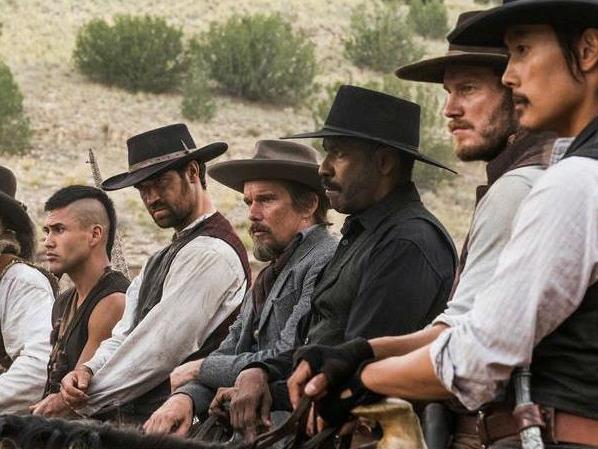The Magnificent Seven. Image via Sony Pictures.
When The Magnificent Seven first galloped onto cinema screens in 1960, corralling a high-profile cast into an American remake of Akira Kurosawa’s Seven Samurai, it did so with swagger, striking sights and rousing sounds. Starring Yul Brynner, Eli Wallach, Steve McQueen, Charles Bronson and James Coburn, John Sturges’ effort possessed as much pluck as its titular posse, which the filmmaker paired with sun-drenched sights of the old west, and what would swiftly become an iconic score. As the group endeavoured to protect a Mexican village from bandits, the feature they were in made just as strong an imprint on watching audiences.
Indeed, a trio of sequels, a television series and a number of other interpretations of the tale all followed — and, in the past twelve months, no fewer than three features that nod to the film in various guises. Revisionist western The Hateful Eight and lowbrow comedy The Ridiculous 6 massaged their monikers out of the now 56-year-old feature; however Antoine Fuqua’s The Magnificent Seven takes its actual name, retraces its storyline and attempts to bring its spirit into modern times.
That temporal updating springs from the movie’s style, rather than its setting, with the action taking place in 1879. When Rose Creek falls under the control of gold-seeking industrialist Bartholomew Bogue (Peter Sarsgaard, Black Mass), its residents are forced to either comply with his corrupt ways or risk their lives trying to fight him. Widow Emma Cullen (Haley Bennett, Hardcore Henry) and her friend Teddy Q (Luke Grimes, Freeheld) bring in support for the latter option, courtesy of warrant officer Sam Chisolm (Denzel Washington, The Equalizer). One by one, he assembles a team to help: crafty hired gun Josh Faraday (Chris Pratt, Jurassic World), sharpshooter Goodnight Robicheaux (Ethan Hawke, Maggie’s Plan) and his knife-wielding pal Billy Rocks (Byung-hun Lee, Terminator Genisys), veteran tracker Jack Horne (Vincent D’Onofrio, TV’s Daredevil), Comanche warrior Red Harvest (Martin Sensmeier, Salem) and Mexican outlaw Vasquez (Manuel Garcia-Rulfo, From Dusk Till Dawn: The Series).
In a screenplay written by Richard Wenk (The Expendables 2) and Nic Pizzolatto (True Detective), the septet bands together, canters into town, starts preparing to dispatch with a vicious enemy and then commences with trying to get their job done. The Magnificent Seven circa 2016 is just as cognisant of the task at hand, similarly wasting little time and sparing little energy or enthusiasm. In fact, Olympus Has Fallen, The Equalizer and Southpaw helmer Fuqua brings not only his penchant for action, but his obvious fondness for his chosen genre. With cinematographer Mauro Fiore (Runner Runner), his vistas are broad, warm and glowing; with composers Simon Franglen (Voyage of Time: Life’s Journey) and James Horner (The Amazing Spider-Man), his film arouses the requisite mood and sentiment.
And, with his three-time leading man and Training Day Oscar winner Washington in the saddle, it also oozes charisma. Elsewhere, The Magnificent Seven is competent at aping its predecessor and increasing its shootout quota — the latter with a well-choreographed though slightly over-extended third act, in particular — but it’s the film’s star that best boosts its fortunes. He doesn’t simply make a statement as the hero in a remake of a type of movie traditionally less diverse in its representation, at least where courageous protagonists are concerned. He also conveys determination and dignity that heightens an otherwise dutiful effort in everything from his expression, his stance and his voice.
There’s a distinctive sense of character that stems from his presence, and one that the feature firmly needs. As much as Fuqua luxuriates in the look and feel of fashioning a western with such strong ties to the past, fleshing out its on-screen figures isn’t The Magnificent Seven’s strong point, other than by way of casting. Accordingly, Washington is ably assisted by a roster of talent operating in several registers, enjoyably exaggerated (Sarsgaard), quietly contemplative (Hawke and Lee), cheekily comic (Pratt), earnest (D’Onofrio) and fiery (Bennett) among them. They mightn’t earn the superlative of the movie’s title, nor does the movie itself — but for 133 minutes, their attempt to follow a familiar path proves a more than rollicking-enough cinematic ride.
Rating: 3.5 stars out of 5
The Magnificent Seven
Director: Antoine Fuqua
USA, 2016, 133 mins
Release date: September 29
Distributor: Sony
Rated: G
Actors:
Director:
Format:
Country:
Release:





